Success Stories
Braj Kishore Sharma -Dairy based IFS System

Name and Address of the Farmer : Braj Kishore SharmaS/o Vijay Sharma,
Vill- Rampur Charui,
Block- Modanganj, Distt.- Jehanabad
Contact no.: 9931459486
Age : 46 yr
Holding Size (in acre) : Graduation (Economics)
Educational Qualification :
Experience in Farming : 15 Years
Brief Description of the Farm / Enterprise : Mr. Braj Kishore Sharma was a traditional farmer and cultivates paddy, wheat, onion etc as well as dairy, fish farming on small scale. He came in contact with KVK, Jehanabad and started a dairy farm with 20 cows, automatic rice mill, vermicompost production as well as Gobargas plant and plantation of fruit plants for diversified income from his agricultural land.
Quote of the Farmer : This IFS model supports me in regular smart income round the year.
Economics of the Farm :
| Enterprise | Area (Acre)/No. | Cost of Production *(per unit) | Return (Rs. Per unit) | Net Income (Rs. per unit) |
|---|---|---|---|---|
| Crop | 7.0 | 456230 | 1120130 | 663900 |
| Fish | 0.5 | 50000 | 130200 | 80200 |
| Dairy | 1.5 | 580000 | 1230000 | 650000 |
| Vermicompost | 0.1 | 20000 | 74000 | 50000 |
| Rice mill | 0.9 | 150000 | 2800000 | 1300000 |
*includes cost of input, labour and others including marketing and transport of the products.
Income level before adopting such farming
| Enterprise | Area (Acre)/No. | Cost of Production | Return (Rs. Per unit) | Net Income |
|---|---|---|---|---|
| Crop | 7 | 456230 | 1120130 | 663900 |
| Fish | 0.5 | 50000 | 130200 | 80200 |
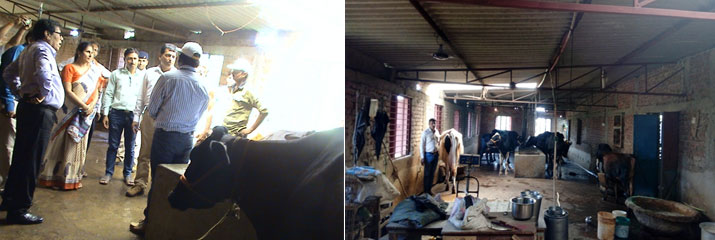
Bee Keeping as small enterprise
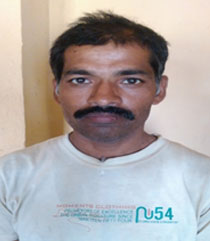
Name and address of the bee keeper : Mr. Vinay Kumar,
Village-Mananpur, Block- Modanganj,
Jehanabad, state-Bihar.
Contact No: .8084768157
Age : 36 years
Holding Size (in acre) : 01
Educational Qualification : Matric
Experience in bee keeping : 3 Years
Brief Description of the Farm / Enterprise : Mr.Vinay Kumar, a small farmer having 1 acre of land, is a progressive bee keeper and has starting bee keeping as enterprises from 2013 with 20 bee boxes after getting training on sustainable beekeeping from KVK Jehanabad. He is a hard working man, showing keen interest in bee keeping for income generation. In the starting his bee boxes affecting by plume moth, mite, lizards and yellow wasp. Mr. Vinay has been take action against these problems to protect his bees. Some bee boxes affected with swarming and absconding, he collect those bees from trees and again introduce in bee boxes. In the season 2015-16, he extract 200 kg honey and sale it in local market @ 250/kg. The total income of Mr. Vinay from bee keeping was 50,000 during 2015-16, season. He has expertise to increase his bee boxes from 20 to 30 in his apiary. After adopting bee keeping, his annual income is Rs. 1,00,000 earlier it was 50,000 to 60,000. He has participated in three days training on bee keeping (18-20 June, 2014), organized by G.B. Pant University of Agricultural & Technology., Pantnagar. He shares his knowledge and experience with other farmers.
Quote of the farmer : Beekeeping is good for income generation
Economics of the Farm :
| Enterprise | Area (Acre)/No. | Cost of Production(Rs. Per unit) | Return (Rs. Per unit) | Net Income(Rs. Per unit) |
|---|---|---|---|---|
| Bee keeping | One unit (20 bee boxes) | 15,000 | 65,000 | 50,000 |
| Dairy | Two cow | 30,000 | 60,000 | 30,000 |
| Crops | Rice-wheat (2 acre) | 40,000 | 75,000 | 35,000 |
*includes cost of input, labour and others including marketing and transport of the products.
Income level before adopting bee keeping
| Enterprise | Area (Acre)/No. | Cost of Production | Return (Rs. Per unit) | Net Income |
|---|---|---|---|---|
| Dairy | Two Cow | 30,000 | 60,000 | 30,000 |
| Crops | Rice-wheat (2 acre) | 40,000 | 75,000 | 35,000 |


Name and Address of the Farmer : Kaushal Kumar Village and Block: Sakroha, Modanganj
Mob no. : 8409351923
Name of ITK : Use of chopped raw onion for the control of external and internal parasites in cattle
Brief description of ITK : Chopped raw onion has been used to feed cattle with a little quantity (200- 250 gms) twice at the interval of 4 weeks and then after six months for control of external and internal parasites like ticks, mytes, leach etc. It is domestic method and since onion is fed in small amount so, it is harmless for the cattle and good for milk productivity and general health of the cattle. It is an economic method as the money which could be spent on the purchase of medicine for the control of external & internal parasites is saved.
“Quote” of farmer regarding the ITK :
Experience in Farming :
Brief Description of the Farm / Enterprise :
Economics of the Farm : According to him, it is an effective method to control these parasites.
Scientifically validated (Yes/No) Yes
Area of practice/adoption About 30-35 percent, dairy farmers have adopted this practice as they find it more economical & easier.
Scope and utility in Bihar The population of parasites (Ticks, mites etc.) is maximum in winter season and in extreme summer season with higher humidity. In such situation, use of onion, which is ever available at household level, is done to control these parasites. This innovation is found to be beneficial by other dairy farmers of the region and they are also following this practice
Photograph Of Innovations
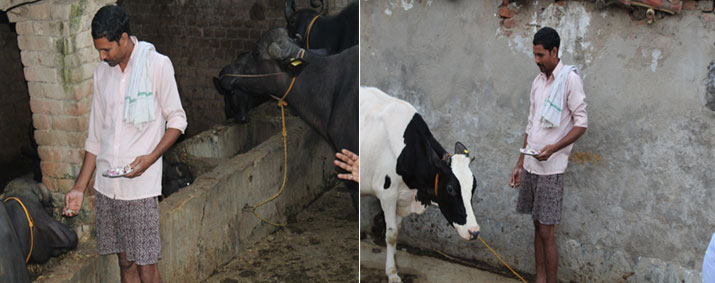
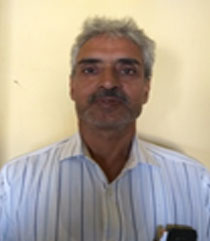
Profile of the Farmer : IV. Name of the farmer: Mr Prem Kumar
Village and Block: Kurwa, Modanganj
Mob no. : 9430009544
Name of ITK : Cow urine decoction of neem leaf
Brief description of ITK : To prepare cow urine decoctions (CUD), 250 gm leaves of neem were added in 500 ml of cow urine and boiled it slowly up to half-original volume then allow for cooling. After that, material was filtered with muslin cloth then filled in bottle and stored into the cool and dry place.
Farmer sprayed it on crops against insect pests @ 1 ltr CUDs of neem in 10 ltr of water
“Quote” of farmer regarding the ITK : The technology has been accepted by farmers. Farmers observed that the test of vegetables was good in comparison to synthetic pesticides
Scientifically validated (Yes/No) : Yes
Area of practice/adoption : Pest management in vegetables, pulses and spices,Pest management in Organic Farming, ITK adopted by farmers in vegetables and pulses
Scope and utility in Bihar : ITK of Cow urine decoction of neem leaf has wide scope in Bihar for Pest management in vegetables, pulses and spices as well as pest management in organic farming.
Photograph Of Innovations
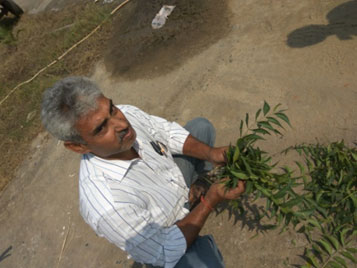

Profile of the Farmer : Yogendra Sharma
Village and Block: Gandhar, Modanganj
Mob no. : 9973592613
Name of ITK : Storage of seeds and grains in cushion constructed of wheat straw and Mahua.
Brief description of ITK : Seeds/ grains packed into gunny bags and stacked sandwiched & covered with wheat straw layer by layer. In between layers, Mahua flowers are kept as storage agent as a result there is no infestation of storage insects and diseases. Stored materials remain fresh and untouched with diseases and pests.
“Quote” of farmer regarding the ITK : Farmers are practicing since very long time with no extra expenditure and no use of any chemical pesticide that harm to the farm family. This technique of storage has been found to be comparatively much cheaper & safer.
Scientifically validated (Yes/No) : No
Area of practice/adoption : About 50 percent farmers have adopted this practice as they find it more economical & easier.
Scope and utility in Bihar : Since, there is no use of chemical pesticides for storage So, it is hygienic & safe method. It will aid to organic farming,eco friendly and good environment.
Photograph of Innovations :
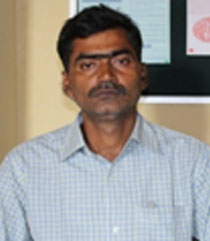
Profile of the Farmer : Name of the farmer: Sant Kumar Sinha
Village and Block: Sakrorha, Block- Modanganj
Mob no. : 7321002392
Name of ITK : Use of "Noni" (Old soil dust) for better wheat yield in moisture stress condition
Brief description of ITK : Wheat seeds were mixed with moist Noni for the whole night and then next day they are sown, so land is utilized. During winter season, due to lack of irrigation facility he is compelled to sow the wheat crop in poor moisture condition that affect the wheat germination. Keeping in view this problem, an idea developed in his mind. The village has some mud houses, which soaks moisture during the rainy season and after its drying, the dust falls from wall on the ground. It is known as 'noni' in local language. He collected it for better germination of wheat. Actually what he does, is in those fields where there is less moisture for wheat sowing and chances of poor germination of wheat, he used moist wheat seed. He dipped the wheat seed in water, bring out the seed and kept it jute sack for 4-5 hour, after that mixed noni in equal amount with wheat seed so that, wheat seed is coated with 'Noni'. He sows the coated wheat seed after field preparation that resulted better germination of wheat.
“Quote” of farmer regarding the ITK : Wheat seed sowing after coating with moist 'Noni' resulted better germination percentage as about 80% in comparision to 50% when sown without Noni coating. Noni acts as soil conditioner, which makes the soil smooth. Noni has some fertilizer properties which results in low requirement of chemical fertilizer. Noni reduces almost 30% chemical fertilizer of basal dose in wheat.
Scientifically validated (Yes/No) : Yes
Area of practice/adoption : In drought condition, in case of scarcity of moisture in soil, farmers use this technique for better germination of wheat seeds. About 60








